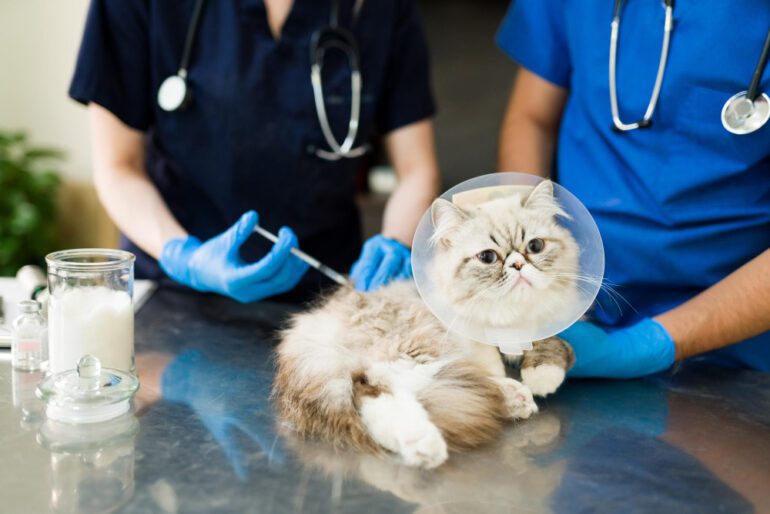Cats are beloved companions to many, and it is natural for owners to be concerned when their furry friends experience any discomfort or illness. However, vomiting is one of the most common signs of an underlying health issue in cats, and owners should be aware of when it may signal a cause for concern.
What Is Normal Vomiting?
Vomiting is a natural part of a cat’s digestive process and can be caused by eating too quickly or eating something that disagrees with them. In these cases, it is usually short-lived and not indicative of major health concerns. Normal vomiting often involves small amounts of bile or partially digested food and may happen occasionally for no apparent reason.
What Is Abnormal Vomiting?
Abnormal vomiting is more concerning than normal vomiting as it can indicate an underlying medical issue. Abnormal vomiting is more frequent and may include blood or other substances, such as fur or bones, in the vomit. It can also occur without warning or in the middle of eating. In these cases, it is essential to seek medical attention from a veterinarian as soon as possible.
Signs That Your Cat May Have a Medical Issue With Vomiting
In addition to abnormal vomiting, there are other signs that your cat may have an underlying medical issue causing their vomiting:
- Loss of appetite
- Lethargy
- Weight loss
- Diarrhea
- Changes in litter box habits
- Bad breath
Causes of Abnormal Vomiting in Cats
There are many potential causes of abnormal vomiting in cats, including but not limited to:
- Gastrointestinal Issues: Gastrointestinal issues like inflammatory bowel disorder (IBD) and irritable bowel syndrome (IBS) can cause recurrent ejection in cats. These predicaments can be tricky to diagnose, so it is imperative to confer with your veterinary if your cat has been encountering periodic episodes of vomiting.
- Infections: Bacterial or viral infections can lead to gastrointestinal distress, resulting in frequent vomiting. Your animal doctor will be able to ascertain if your feline has a contagion by executing experiments such as a feculent examination or urine test. If a disease is revealed, they will require antibiotics or other medications for therapy.
- Food Intolerances: Food intolerances can cause digestive upset, leading to frequent vomiting in cats. Suppose your cat has been experiencing recurrent bouts of vomiting after eating certain types of food. In that case, it may have an intolerance that must be addressed by avoiding those foods and offering alternative options. Your veterinarian may also recommend specific diets for cats with food intolerances.
- Parasites: Internal parasites such as roundworms and tapeworms can cause gastrointestinal distress, leading to frequent vomiting in cats. If you surmise that your feline has parasites, they must be inspected by your veterinary specialist with the end goal of them recommending the appropriate prescription for treatment if necessary.
- Kidney Disease: Nephropathy is an infrequent source of incessant regurgitation in felines. Your vet should continually check if different causes have been excluded or if there are other markers implying kidney disease (for instance, augmented thirstiness). If kidney disease is determined, your vet will make a treatment plan in light of the seriousness of the condition, which might incorporate dietary alterations and drugs as required.
- Cancer: Cancer can also lead to recurrent bouts of vomiting in cats and should always be considered if other causes have been ruled out or if there are any additional signs indicating cancer (such as weight loss). Your animal doctor will execute analytical tests like blood work and imaging investigations if neoplasia is conjectured so they can build a pertinent healing program depending on the variety and degree of cancer discovered.
When To Seek Veterinary Care For Your Cat's Vomiting
It is vital to obtain veterinary attention immediately if your feline has been experiencing persistent episodes of aberrant regurgitation that last more than 24 hours or if there are any other signs implying an inherent medical problem (like loss of hunger, sluggishness, decrease in weight, looseness of the bowels, alterations in litter box routines, etc.). Your vet will conduct a physical examination on your cat and run diagnostic tests like blood work and imaging studies as required so they can recognize the source of their indications and form a suitable therapy plan based on their discoveries. Treatment plans may include dietary changes, medications, surgery (if necessary), etc., depending on the underlying cause found during their examination and diagnostic testing results.
Conclusion
Vomiting is one of the most common signs that something isn’t quite right with our feline friends; however, it isn’t always indicative of a serious medical issue—especially when it occasionally occurs without warning or after eating something disagreeable. Owners should always be aware when it could signal a cause for concern so they can seek veterinary care right away, if necessary.

